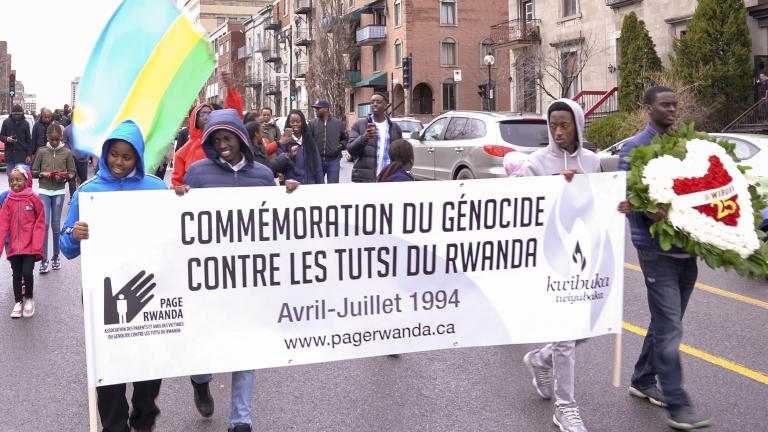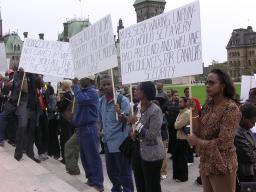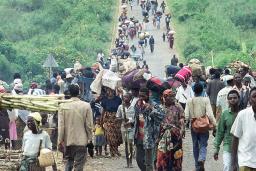Though the 1994 Genocide against the Tutsi in Rwanda occurred far from Canada, it had a profound impact on the Rwandan Canadian community.
Justice after genocide: Rwandan Canadian community activism
Seeking justice in Canada after the genocide against the Tutsi in Rwanda
By Jeremy Maron
Published: March 23, 2022
Tags:

Photo: CMHR, Keith Fraser
Story text
Even as the genocide was taking place between April and July 1994, Rwandan community members in Canada began to mobilize. People and organizations, such as the Montreal‐based PAGE‐Rwanda (l’Association des parents et amis des victimes du génocide au Rwanda), took action to provide survivors, their families and friends with much‐needed solidarity and support.
In the aftermath of the genocide, it became clear that many perpetrators and planners of the atrocity were fleeing or had fled Rwanda and scattered around the world. Rwandan Canadian community members were soon shocked to discover that some of those responsible for the genocide had managed to arrive in Canada by hiding or distorting their involvement.
Two perpetrators of particular note had arrived on Canadian soil. Léon Mugesera was a propagandist with the Rwandan government who had delivered a vehement and incendiary anti‐Tutsi speech prior to the genocide. Désiré Munyaneza was suspected of leading a militia and personally committing acts of violence and murder during the genocide.

Employing both community activism and means available in the Canadian legal system, the Rwandan Canadian community began the long process of advocating for justice. These efforts would eventually contribute to the deportation of Mugesera to face trial in Rwanda and the criminal conviction of Munyaneza in Canada – to date the only conviction under Canada’s Crimes Against Humanity and War Crimes Act.

These community‐led efforts for justice are explored in The Power of Community: Seeking Justice after the Genocide Against the Tutsi in Rwanda. This original documentary film was produced by the Canadian Museum for Human Rights in collaboration with PAGE‐Rwanda. It features first‐hand testimony from members of the Rwandan Canadian community who were involved these mobilizations. Learn about their motivations and strategies for pursuing justice, some of the disappointments, challenges and successes they faced along the way, and what it meant for community members to know there was a possibility to pursue justice, even far away from where the genocide took place.
These efforts show how powerful a community can be when people come together in the aftermath of violence, refuse to be silent and advocate for human rights.
Video: The Power of Community: Seeking Justice After the Genocide Against the Tutsi in Rwanda
Ask yourself
What does it mean to hold people accountable for their actions?
Can you think of a time when you held someone accountable for a harm they committed?
How can you take action when human rights violations happen in distant parts of the world?
Explore more stories
What led to the genocide against the Tutsi in Rwanda?
By Jeremy Maron
Learn how division, dehumanization and incitement of hatred set the stage for genocide.

Suggested citation
Suggested citation : Jeremy Maron. “Justice after genocide: Rwandan Canadian community activism.” Canadian Museum for Human Rights. Published March 23, 2022. https://humanrights.ca/story/justice-after-genocide-rwandan-canadian-community-activism